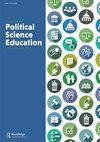学生如何学习在线课程:并非所有内容都需要视频
IF 0.6
Q3 POLITICAL SCIENCE
引用次数: 0
摘要
摘要随着学生和技术的变化,教师的教学方式也必须发生变化,至少在一定程度上也是如此。一个在学生和科技领域都很明显的变化是教学视频的使用增加了。如今,传统的老年大学生成长在这样一个时代,包括免费社交媒体和付费正规服务在内的各种形式的流媒体视频已经成为消费信息的标准方式。为此,教师们越来越期望在学生所在的地方与他们见面,并创建我们自己的视频来提供课程内容。这项研究的目的是检验录制的视频与书面讲座相比,在提供课程内容和帮助学生取得成功方面的有效性。具体来说,这项研究为学生提供了两种不同的选择,让他们在中西部郊区社区大学的一年级和二年级政治学课程中接受演讲内容。学生可以通过阅读课堂讲稿或观看讲师复习讲稿的视频来获得课堂材料,也可以两者兼而有之。通过使用定量和定性测量,本研究考察了学生如何消费讲座材料,并比较了他们的学术成果与对课程和老师的看法之间的差异。本文章由计算机程序翻译,如有差异,请以英文原文为准。
How Students Consume Online Lectures: Not Everything Needs to be a Video
Abstract As students and technology change, the way teachers teach must, at least to some extent, change too. One change that is evident in both students and technology is an increase in the use of instructional videos. Traditional-aged college students today have grown up in an age where streaming videos from various formats including free social media and paid formal services have become a standard way to consume information. To that end, there are growing expectations on faculty to meet students where they are and create our own videos for delivering course content. The goal of this study is to examine how effective recorded videos are, in comparison to written lectures, at delivering course content and helping students be successful. Specifically, this study presented students with two different options for receiving lecture content in first- and second-year political science courses at a suburban, midwestern, community college. Students could receive lecture material by either reading lecture notes or by watching videos of the instructor going over the notes–or both. By using both quantitative and qualitative measures, this study examined how students consumed lecture material and compared the differences between their academic outcomes and perceptions of both the course and their instructor.
求助全文
通过发布文献求助,成功后即可免费获取论文全文。
去求助
来源期刊

Journal of Political Science Education
POLITICAL SCIENCE-
CiteScore
1.80
自引率
36.40%
发文量
69
期刊介绍:
The Journal of Political Science Education is an intellectually rigorous, path-breaking, agenda-setting journal that publishes the highest quality scholarship on teaching and pedagogical issues in political science. The journal aims to represent the full range of questions, issues and approaches regarding political science education, including teaching-related issues, methods and techniques, learning/teaching activities and devices, educational assessment in political science, graduate education, and curriculum development. In particular, the journal''s Editors welcome studies that reflect the scholarship of teaching and learning, or works that would be informative and/or of practical use to the readers of the Journal of Political Science Education , and address topics in an empirical way, making use of the techniques that political scientists use in their own substantive research.
 求助内容:
求助内容: 应助结果提醒方式:
应助结果提醒方式:


